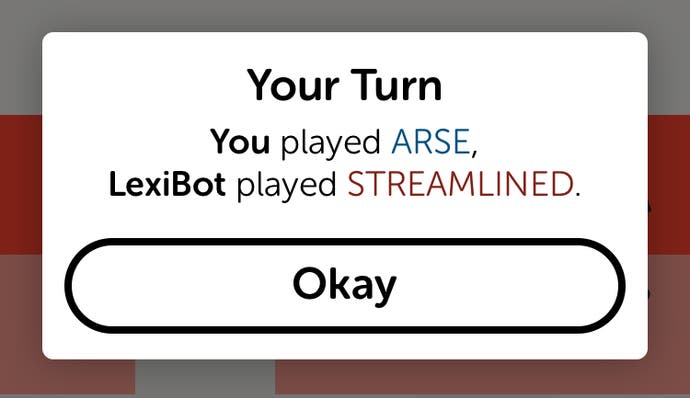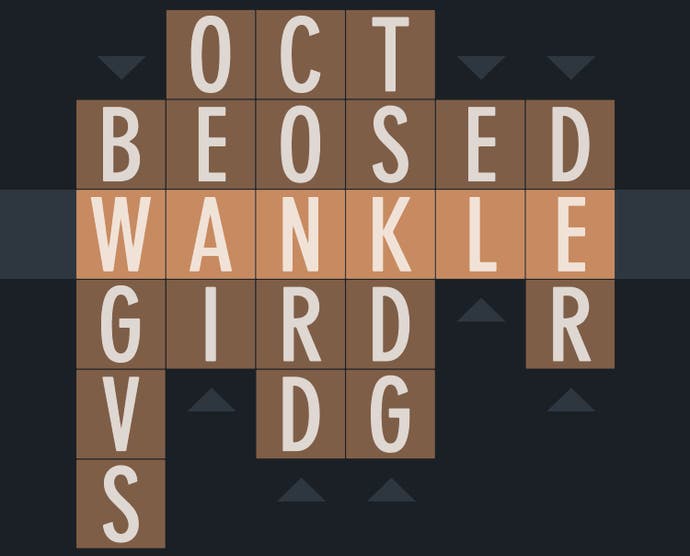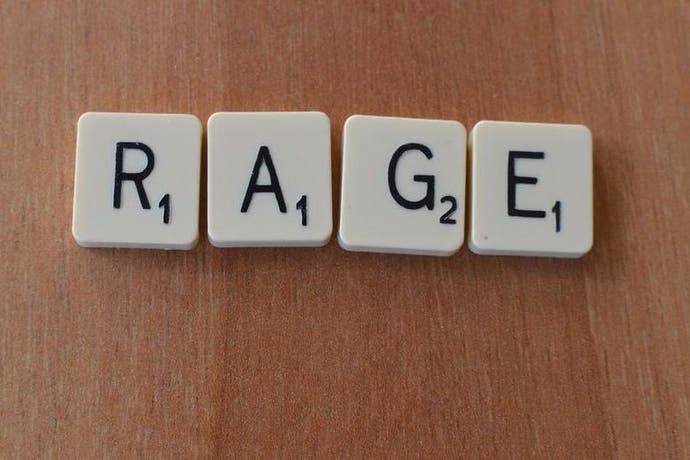My word game rage shame
Hell hath no fury like Ellie Gibson losing at Scrabble.
Earlier this month I became a published author. Don't worry, this isn't about to become a thousand-word plug for my book, which is out now on Amazon for barely a fiver, and consistently receiving glowing reviews. (Sample: "Literally the best book i have ever written. 7/10" - Ellie Gibson)
I wrote the book with my dear friend, comedy buddy and above all business associate, Helen Thorn. People often ask me what it's like to write with someone else. I reply that it's an enriching experience, because you have access not only to instantaneous critique, but help with channelling the creative flow. Best of all, you only have to write half the words.

In all seriousness, I loved writing with Helen. It was an intense process, but we never exchanged a cross word. (Apart from the time she put the milk in before taking the teabag out. But we do not speak of this.)
What has all this got to do with video games, I hear my employer ask? Well, I can spend countless hours playing happily with my friend in the great sandbox that is the English language as we harmoniously construct a joyous and towering literary triumph. But pit us against each other in a word game, and I will take that f***ing b**** down.
There's just something about word games. Most of the time, I'm not a particularly competitive player. Sure, I like a good shouty bout of Mario Kart as much as the next person. And yes, there was that time I spent so many hours trying to beat the Pac-Man high score of former Eurogamer editor Tom Bramwell that I got a blister on my thumb. And almost the sack.
But while I enjoy a bit of friendly rivalry, I don't like aggression, which is why I never usually play games online. I haven't bothered plugging my headset in since an incident about five years ago, where I found myself in the midst of a disgusting exchange of violently misogynistic taunts and homophobic abuse. And that was during a round of Uno Rush.
But because most online word games are turn-based, it's much easier to play with your friends. And as we all know, thrashing someone you love is much more enjoyable than beating a sweary 12 year-old racist from Rotterdam.
Plus, winning at a word game has the bonus of making you feel intellectually superior. You're not just winning at a video game - you're proving you have the better mastery of language, and are therefore the most cleverest.
This is absolute nonsense, of course. It's similar to the misconception that makes beginner Scrabble players think it's all about showing off with big long words. The smart competitor understands one must take a broader overview of the board, restrict your opponent's options whenever possible, and know that "qi" is actually a word actually so f*** you.
My favourite word game of all time is Letterpress, because it rewards you both for playing strategically and showing off with big long words. The idea is to lock out letters by securing their borders, turn by turn, until you've taken over the whole board. Basically, it's Scrabble meets Risk.

Letterpress took over my life a few years ago. It provided many happy hours of cerebral contemplation. It was also the source of bitter enmity and rage the likes of which I had never previously known, and I once watched an episode of Peter Andre: My Life.
Which makes me think, like Carrie out of Sex and the City, except if she was writing about video games instead of how smoking fags is like boning your ex-boyfriend - am I a raging gamer? Am I really any better than those teenagers screaming insults in each other's faces and down each other's headphones?
Yes, obviously. Because I am a grown-up, and have learned to regulate my emotions. When my friends beat me at Letterpress, I didn't shout and scream or call them names or inform them that my dog had recently enjoyed sexual relations with their mother. I simply sent them an abusive text and moved on with my life.
Now, two children later, I don't even have the energy for that. Rivalry makes me tired. I still love a good word game, though, and I can recommend Typeshift, the new offering from Spelltower creator Zach Gage. Here you're presented with a grid of letters, and the idea is to rotate the columns until you've used each one to spell a word. There are also crossword puzzles, which are even more fun if you read the clues out in the voice of Tom O'Connor.
There's no online mode, but therefore no annoying notifications reminding you to take your turn, when you're already in the middle of changing a nappy and finding the PE shorts and worming the cat. And there's no rage, because you can't lose - the only options are to keep trying until you win, or give up. Anyone who's ever tried to put a coat on a four year-old will know what this is like.
Another iOS title I'd recommend for parents is I Love Hue. It's not a word game, but it's good for when you've spent three hours reading Biff and Kipper's Tedious Adventures in Phonics and never want to look at a letter again. There's a grid of coloured tiles and you have to arrange them into a perfectly ordered spectrum. It's quiet, peaceful, tidy, pretty, and relaxing. Basically, if you have a child, it's the exact opposite of your house.
I do hope that one day, when I have more time and energy, I will once again be enraged by word games. I like the idea of being expelled from an old people's home for going on a violent rampage over a controversial move in Bananagrams.
Perhaps that day might come even sooner, as I just sent Helen an invitation to play Letterpress. I'll show her teabagging.

